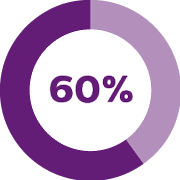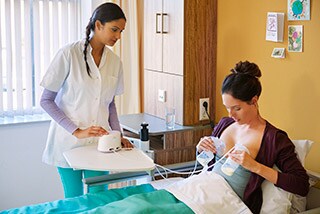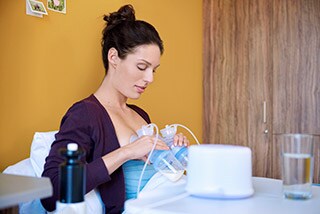World
Breastfeeding Week
Breastfeeding is highly beneficial for mothers and babies. All the nutrients necessary for healthy infant growth and development are present in breast milk. Children who are breastfed for longer have less chronic health issues, lower infection, fewer dental malocclusions, and higher intelligence than those who are breastfed for shorter periods, or not breastfed2. In fact, the World Health Organization recommends exclusive breastfeeding up to 6 months of age3. But this very natural act does not come easily to every new mother. Stress, embarrassment, and lack of knowledge are all impediments to successful breastfeeding. So it’s important that parents feel comfortable turning to you for expert advice. As a healthcare professional, you can provide parents with critical support, guiding them to the feeding solution best suited to them – one that will give their baby the best start in life.

Up to 60% of women who breastfeed stop earlier than they want to1.

It has been postulated that for an adequate breast milk let-down response, psychological relaxation is necessary. We specifically investigated whether more comfort results in more milk as this was yet to be demonstrated in a clinical study using breast pumps. Read this study summary to better understand the benefits of relaxation.

Philips Avent breastfeeding posters,folder,and leaflet are available here to download and print. Take advantage of these materials that emphasize the importance of early breastfeeding for new mothers.
As a healthcare professional you are a nursing mother’s primary source for expertise on initiation, positioning, and routine. Some new mothers experience problems with infant sucking or latching on, which can cause pain or discomfort during breastfeeding; others believe that they do not produce enough milk; some encounter medical problems, or choose to return to work early1, 4. When mothers and parents need help, you can help them find the best infant feeding solution. Key to success is the ability to relax. Milk volume and flow are closely linked to mother’s psychological wellbeing and stress levels6-8. In a study carried out by Philips Avent, mothers expressed significantly more milk after 10–15 minutes of doing a breathing exercise or listening to music9. In addition, a quiet location away from daily distractions or prying eyes can help. Today, many family-friendly venues provide dedicated spaces where a mother can breastfeed her baby or express milk in a calm relaxing environment.
Returning to work can be another barrier. Nearly one in five mothers in the United States4 and one in ten mothers in Europe1 stop breastfeeding upon returning to work. These mothers must be supported to find appropriate infant feeding solutions to help express milk during the workday. Mothers can ask for a dedicated place to breastfeed or express breast milk and may seek support from their healthcare professional in doing so. Educational materials to support infant feeding are available along with tips and instructions for proper lactation, expressing, and comfort. Your valued opinion can make a difference. Remember, women asking for support or having direct access to healthcare professionals are more likely to continue to breastfeed for a longer period of time4.

Real-time 3D ultrasound imaging of infant tongue movements during breastfeeding
3D ultrasound scanning can be used to view an infant’s tongue movements. Study was conducted to better understand the physiology of breastfeeding and the relative importance of vacuum and peristalsis in milk extraction.

Randomized trial comparing the effectiveness of two electric breast pumps in the NICU Many preterm infants are too weak to breastfeed, leading to reliance on expressed milk. This trial compares two double electric breast pumps and details the primary and secondary results.

Predictors of expressed breast milk volume in mothers expressing milk for their preterm infant This study concludes: “In multivariate analyses, double pumping, early establishment of milk production and perceived comfort of the breast pump were the strongest predictors of milk production.”


1 Odom EC, et al. Pediatrics 2013;131:e726 2 Victora CG, et al. Lancet 2016;387:475–490 3 World Health Organization, United Nations Children’s Fund. Global strategy for infant and young child feeding. http://www. who.int/nutrition/topics/global_strategy/en/. Published 2002. Accessed March 5, 2013 4 De Jager M, et al. Eur Obstet Gyn Suppl 2012:25–30. http://www.newscenter.philips.com/pwc_nc/main/shared/assets/es/Downloadablefile/breastfeeding/ 5 Li R., et al. Pediatrics 2008;12:S69–S76 6 Lau C. Pediatr Clin North Am 2001;48:221–234 7 Newton M, et al. J Pediatr 1948;33:698–704 8 Ueda T, et al. Obstet Gynecol 1994;84:259–262 9 Philips Avent Relaxation Study. Data on file.
bareers_to_breastfeeding.pdf; accessed June 1, 2016
You are about to visit a Philips global content page
Continue